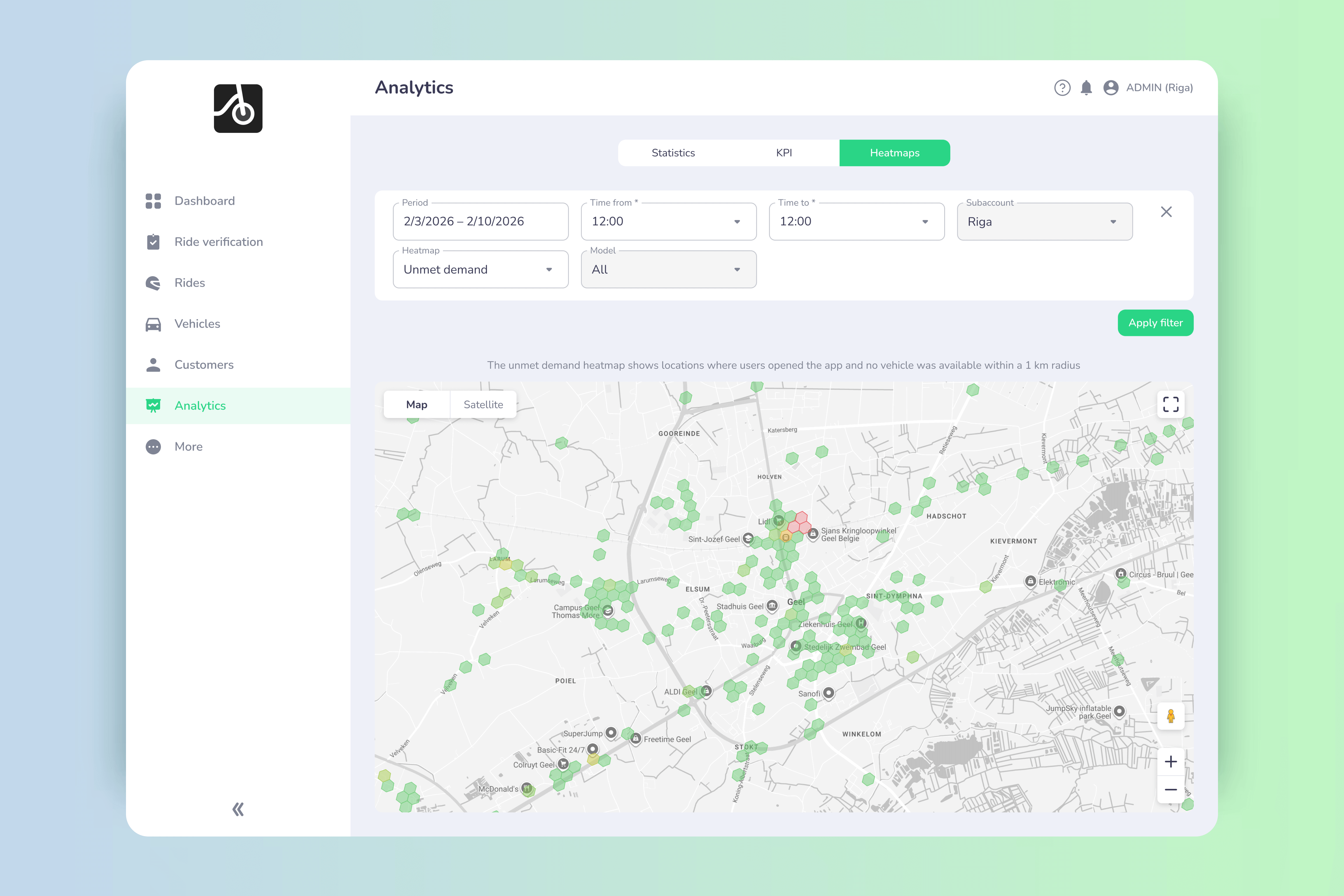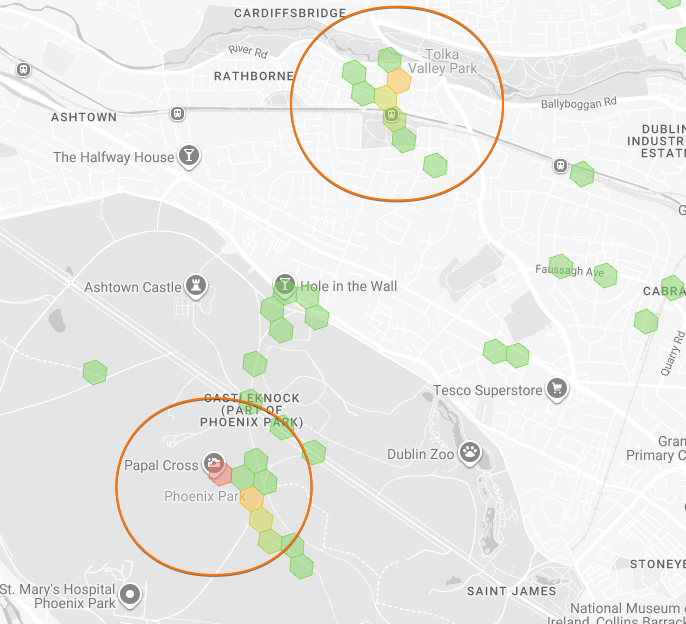%20(1).png)
Bike-sharing has had a wild ride over the past ten years. Some companies threw thousands of bikes onto city streets without permission, while others spent tons of money but couldn’t figure out how to make a profit. Donkey Republic took a different approach—and it worked.
Started in Copenhagen in 2014, Donkey Republic didn’t rush to expand or rely on big investors. Instead, it focused on working with cities, keeping things simple, and making sure the business could actually make money. In 2023, the company earned €15.4 million (DKK 115.2 million), up 70% from the previous year, and, more importantly, it made a profit of €1.27 million (DKK 9.5 million).
From a simple idea to a growing business
The company’s founder, Erdem Ovacik, got the idea when he saw a friend using combination locks to share bikes with others in Copenhagen. He figured there had to be a better way. The answer? A mobile app and smart locks, so people could rent a bike quickly without needing a docking station.
In 2015, Donkey Republic started with just 30 bikes. Instead of flooding the streets with bikes and hoping for the best, it worked directly with city governments to get approval. That helped avoid the problems that companies like Ofo and Mobike faced when they expanded too fast and then collapsed.
The key of not overdoing
A lot of bike and scooter companies try to grow as fast as possible, spending loads of money and hoping to make a profit later. Donkey Republic didn’t do that. By 2020, it had expanded to 13 countries, including Germany, Spain, the Netherlands, and Finland, but always in a controlled way.
A big part of its success comes from working with cities instead of fighting them. Instead of just dropping bikes on the street and hoping no one complains, Donkey Republic made agreements with local governments. This means the company doesn’t have to worry as much about sudden bans or changing rules.
For example, in 2023, Paris banned rental e-scooters, which was a disaster for other companies. But because Donkey Republic focuses on bikes, it wasn’t affected.
Financial growth and key milestones
Donkey Republic has shown impressive financial progress in recent years. In 2023, the company reported a revenue of DKK 115.2 million – a 70% increase compared to the previous year. Even more importantly, they achieved a positive EBITDA (Earnings before interest, taxes, depreciation, and amortization) of DKK 9.5 million, marking a shift toward profitability.

2024 has been even stronger for Donkey Republic. The company reported a revenue of DKK 145 million, representing a 25% increase from 2023. For the first time, they also recorded a positive EBIT of DKK 1 million. This shows that their long-term strategy of working with cities and optimizing operations is paying off.
What makes Donkey Republic different?
Several factors have contributed to Donkey Republic’s success:
- Emphasize partnerships – Rather than competing with cities, they work alongside them, forging long-term agreements that drive stability and growth. Approximately 30% of their revenue stems from B2G and B2B long-term contracts, including subsidies.
- Technology-driven approach – Their smart locks and app-based rentals make it easy for users to find and use bikes anytime.
- Financial sustainability – While some bike-sharing companies struggle with profitability, Donkey Republic has managed to grow revenue while keeping costs under control.
- Commitment to sustainability – By promoting cycling as an alternative to cars, they contribute to cleaner and less congested cities.
What’s next for Donkey Republic
While Donkey Republic has shown that micromobility can be profitable, the road ahead isn’t without challenges. Competition is fierce, and other companies are rapidly expanding their e-bike fleets to compete in Donkey Republic’s space. Additionally, while city partnerships provide stability, they also limit rapid expansion – municipal contracts take time to secure, and some cities prefer to invest in their own public bike-sharing programs.
Still, Donkey Republic is betting that the demand for sustainable, city-friendly transport will only grow. With urban areas across Europe cracking down on car use – such as London’s Ultra Low Emission Zone (ULEZ) and Paris’s car-restriction policies – bike-sharing is well-positioned to thrive.
So while scooter operators continue to battle regulatory headaches and profit struggles, Donkey Republic is proving that a disciplined, city-first approach might just be the key to lasting success in micromobility.
Click below to learn more or request a demo.

The micromobility industry doesn’t need another generic mobility conference. 🚫🎤 It needs real conversations between operators who are actually in the field. ⚙️ That’s exactly what ATOM Connect 2026 is built for. 🎯🤝
The shared mobility industry is evolving rapidly. Operators are navigating scaling challenges, regulatory complexity, hardware decisions, fleet optimization, and new integration models, all while aiming for sustainable growth.
That’s exactly why ATOM Mobility is organizing ATOM Connect 2026.
Our previous edition of ATOM Connect brought together professionals from the car sharing and rental industry for focused, high-quality discussions and networking. This year, we are narrowing the focus and dedicating the entire event to one fast-moving segment of the industry: shared micromobility.
ATOM Connect 2026 is designed specifically for operators, partners, and decision-makers working in shared micromobility. It is not a broad mobility conference or a public exhibition. It is a curated space for industry professionals to exchange practical experience, insights, and lessons learned.
On May 14th, 2026 in Riga, we will once again bring the community together, this time with a clear focus on micromobility.
What to expect
This year’s agenda will address the real operational and strategic questions shaping shared micromobility today:
- Scaling fleets sustainably
- Multi-vehicle operations beyond scooters
- Regulatory cooperation and long-term city partnerships
- Data-driven fleet optimization
- MaaS integration and ecosystem collaboration
- Marketing and automation for growth
As usual, we aim to host both local and international operators from smaller, fast-growing fleets to established large-scale players alongside hardware providers and ecosystem partners.
On stage, you’ll hear from leading shared mobility companies - including Segway on hardware partnerships, Umob on MaaS integration, Anadue on data-driven fleet intelligence, Elerent on multi-vehicle operational realities and more insightful discussions.
The goal is simple: meaningful discussions with people who understand the operational realities of the industry.
A curated, industry-focused event
ATOM Connect is free to attend, but participation is industry-focused (each submission is manually reviewed and verified). We are intentionally keeping the audience relevant and aligned to ensure high-quality conversations and valuable networking.
If you work in shared micromobility and would like to join the event, you can find the full agenda and register here:
👉 https://www.atommobility.com/atom-connect-2026
In the coming weeks, we will be revealing more speakers and additional agenda updates. We look forward to bringing the industry together again.

📉 Every unmet search is lost revenue. The unmet demand heatmap shows where users actively searched for vehicles but none were available - giving operators clear, search-based demand signals to rebalance fleets 🚚, improve conversions 📈, and grow smarter 🧠.
Fleet operators don’t lose revenue because of lack of demand - they lose it because demand appears in the wrong place at the wrong time. That’s exactly the problem the Unmet demand heatmap solves.
This new analytics layer from ATOM Mobility shows where users actively searched for vehicles but couldn’t find any within reach. Not guesses. Not assumptions. Real, proven demand currently left on the table.
What is the unmet demand heatmap?
The unmet demand heatmap highlights locations where:
- A user opened the app
- Actively searched for available vehicles
- No vehicle was found within the defined search radius
In other words: high-intent users who wanted to ride, but couldn’t. Unlike generic “app open” data, unmet demand is recorded only when a real vehicle search happens, making this one of the most actionable datasets for operators.
Why unmet demand is more valuable than app opens
Many analytics tools track where users open the app (ATOM Mobility provides this data too). That’s useful - but incomplete. Unmet demand answers a much stronger question:
Where did users try to ride and failed? That difference matters.
Unmet demand data is:
✅ Intent-driven (search-based, not passive)
✅ Directly tied to lost revenue
✅ Immediately actionable for rebalancing and expansion
✅ Credible for discussions with cities and partners

How it works
Here’s how the logic is implemented under the hood:
1. Search-based trigger. Unmet demand is recorded only when a user performs a vehicle search. No search = no data point.
2. Distance threshold. If no vehicle is available within 1,000 meters, unmet demand is logged.
- The radius can be customized per operator
- Adaptable for dense cities vs. suburban or rural areas
3. Shared + private fleet support. The feature tracks unmet demand for:
- Shared fleets
- Private / restricted fleets (e.g. corporate, residential, campus)
This gives operators a full picture across all use cases.
4. GPS validation. Data is collected only when:
- GPS is enabled
- Location data is successfully received
This ensures accuracy and avoids noise.
Smart data optimization (no inflated demand)
To prevent multiple searches from the same user artificially inflating demand, the system applies intelligent filtering:
- After a location is stored, a 30-minute cooldown is activated
- If the same user searches again within 30 minutes And within 100 meters of the previous location → the record is skipped
- After 30 minutes, a new record is stored - even if the location is unchanged
Result: clean, realistic demand signals, not spammy heatmaps.
Why this matters for operators
📈 Increase revenue
Unmet demand shows exactly where vehicles are missing allowing you to:
- Rebalance fleets faster
- Expand into proven demand zones
- Reduce failed searches and lost rides
🚚 Smarter rebalancing
Instead of guessing where to move vehicles, teams can prioritize:
- High-intent demand hotspots
- Time-based demand patterns
- Areas with repeated unmet searches
🏙 Stronger city conversations
Unmet demand heatmaps are powerful evidence for:
- Permit negotiations
- Zone expansions
- Infrastructure requests
- Data-backed urban planning discussions
📊 Higher conversion rates
Placing vehicles where users actually search improves:
- Search → ride conversion
- User satisfaction
- Retention over time
Built for real operational use
The new unmet demand heatmap is designed to work alongside other analytics layers, including:
- Popular routes heatmap
- Open app heatmap
- Start & end locations heatmap
Operators can also:
- Toggle zone visibility across heatmaps
- Adjust time periods (performance-optimized)
- Combine insights for strategic fleet planning
From missed demand to competitive advantage
Every unmet search is a signal. Every signal is a potential ride. Every ride is revenue. With the unmet demand heatmap, operators stop guessing and start placing vehicles exactly where demand already exists.
👉 If you want to see how unmet demand can unlock growth for your fleet, book a demo with ATOM Mobility and explore how advanced heatmaps turn data into decisions.


